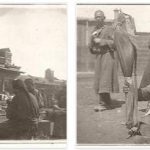Mali everyday life
Currency: Franc CFA (FCFA) BCEAO
Exchange rate: 656 francs CFA per 1 euro
Time zone: UTC
Country code (phone): 00223
Climate (for capital): tropical
Entry and residence regulations
To enter Mali, a valid visa, an entry form from the Malian Ministry of Health and a certificate of a negative COVID-19 test, which must not be older than three days, are required. Comprehensive information about the currently applicable entry regulations can be found on the Mali website of the Federal Foreign Office. You can apply for
a visa at the Malian embassy in Berlin.
Housing and provision
There are two international schools in Bamako: the French grammar school, which also has a primary school, and the American school.
While there is a relatively good supply offer in Bamako, there is a comparatively good supply of fruit and vegetables, several supermarkets and numerous restaurants, the supply options in the interior are very limited. Information about eating habits and supply options can be found at afrika-travel. Vegetarians only find a very limited range of options in many restaurants, as the non-consumption of meat in Mali is mostly associated with a lack of purchasing power and only very rarely with a vegetarian lifestyle.
Some typical dishes such as rice with peanut sauce or rice with farkoy sauce contain a lot of fat and are accordingly heavy in the stomach. The national drink tea is mostly made with Chinese tea powder and lots of sugar. Tea preparation and tea consumption have an important social function. Tea rounds, the so-called grins, are a permanent fixture in the life of the young generation. In the Grins, groups of friends come together to drink tea, chat largely undisturbed and, if necessary, support each other as much as possible. The Grins thus offer young people important, recognized freedom in a hierarchical society.
The housing market in Bamako offers numerous properties of higher standards. The Badalabougou and Torokorobougou neighborhoods are particularly popular with Europeans and Americans. In the past few years, rents for medium-sized and upscale properties have risen significantly.
Outside of Bamako, on the other hand, the search for residential properties that correspond to common European ideas is more difficult.
Knowledge of the Malian holidays is very helpful in professional and everyday life.
Money and money transfer
The currency in Mali is the Franc CFA (FCFA). Mali is a member of the West African FCFA zone. Before the introduction of the euro, the FCFA was linked to the French franc through a fixed exchange rate of 1: 100. This link was retained when the EURO was introduced. The exchange rate is 1 euro = 655.9 FCFA.
2000 FCFA certificate from BCAO
Maintaining this fixed rate is subject to the will of the European Central Bank (ECB) and can be canceled at any time.
In Bamako, in particular, you can pay with euros in hotels, supermarkets and many retailers. You can exchange euro bills in banks as well as at hawkers, whereby a considerable amount of caution is required with the latter. Checks can also be cashed in banks, although high processing fees may apply and patience is sometimes required.
According to topb2bwebsites, Mali is a country located in Western Africa. Money transfers from Germany to Mali are generally possible, but they can be time-consuming and expensive. The use of credit cards is so far not very widespread and is largely limited to larger hotels, airlines and car rental companies. In Bamako and all larger cities, you can withdraw cash in banks from ATMs with credit cards.
5000 FCFA note from BCAO
Security for foreigners
The Federal Foreign Office advises against travel to Mali that is not urgently required. Due to the conflicts in northern and central Mali in particular, people are currently expressly warning against traveling to certain parts of the country (Timbuktu, Kidal, Gao, Taoudenni, Mopti and Ségou regions; northern parts of the Kayes and Koulikoro regions and the northeastern part of the Sikasso region).
Before starting a trip, you should definitely find out more on site, as the security situation can sometimes change at short notice. It should also be noted that there is still an increased risk of falling victim to terrorist groups in Bamako and the rest of the country. The Federal Foreign Office therefore advises these areas, including Bamakos, to be particularly careful and to comply with its safety recommendations and instructions. The danger posed by criminal groups should not be underestimated.
Stay healthy
For the health situation is particularly emphasized that the incidence of malaria tend to be year-round is in much of the country a risk to health. If you are staying for a shorter period of time, you should protect yourself by taking appropriate prophylactic measures. Diarrheal diseases with accompanying dehydration are usually not a dangerous threat. Due to the extremely poor health care outside of the cities, however, such illnesses, as well as injuries resulting from traffic accidents, can quickly become very serious.
The travel medical information service Fit for travel also offers detailed information on the health situation in the country and prevention options.










